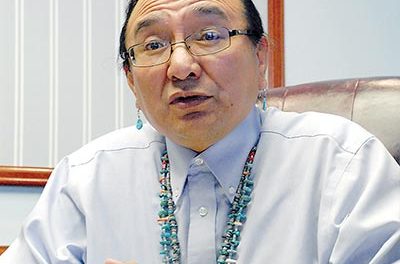
Lawyers: Court fight against DAPL just begun

Special to the Times | Bucky Harjo Air Force and Marine Corps veteran TyAnn Nakai, left in green dress, originally from Lupton, Arizona, stands on the front line with other veterans Monday in Cannonball, North Dakota. Nakai braved the chilling blizzard helping protect the protestors and the elders.
WINDOW ROCK
Another attempt to halt the Dakota Access Pipeline failed in court Tuesday.
The Cheyenne River Sioux Tribe joined with the Standing Rock Sioux tribe to fight the Dakota Access Pipeline under the Missouri River, but U.S. District Court Judge James Boasberg denied a preliminary injunction request from the Cheyenne River Sioux Tribe. The judge said the tribe had not met the standard required for such an injunction as he ruled on Standing Rock Sioux Tribe and Cheyenne River Sioux Tribe V. U.S. Army Corps Of Engineers and Dakota Access, LLC.
“Cheyenne River seeks preliminary-injunctive relief to protect its members’ free exercise of religion, which it argues will be compromised by the presence of crude oil in the Dakota Access pipeline under Lake Oahe,” Boasberg wrote in his ruling.
He said in the decision that the motion by the tribe referenced a “Black Snake prophecy” and appealed to stop the flow of oil under the drilling site under the river called Lake Oahe under the Religious Freedom Restoration Act.
“Only once Dakota Access had built up to the water’s edge and the Corps had granted the easement to proceed did Cheyenne River inform Defendants that the pipeline was the realization of a long-held prophecy about a Black Snake and that the mere presence of oil in the pipeline under the lakebed would interfere with the Tribe’s members’ ability to engage in important religious practices,” Boasberg said.
In addition, he said a standard for such an injunction that the plaintiff prove the likelihood of success in pursuing the issue in court had not been met. In other words, if the tribe had shown in their motion that they were highly likely to succeed in court proceedings, they would have gotten an injunction. The judge didn’t see it that way, so he didn’t grant such an injunction.
Other considerations also factored into the judge’s decision including the concept of “laches,” which is essentially a failure to assert legal rights in a timely manner.
Nicole Ducheneaux, attorney for the Cheyenne River Sioux Tribe, in a conference call said the tribe has no other source of water.
To read the full article, pick up your copy of the Navajo Times at your nearest newsstand Thursday mornings!
Are you a digital subscriber? Read the most recent three weeks of stories by logging in to your online account.







 Highway 264,
Highway 264, I-40, WB @ Winslow
I-40, WB @ Winslow